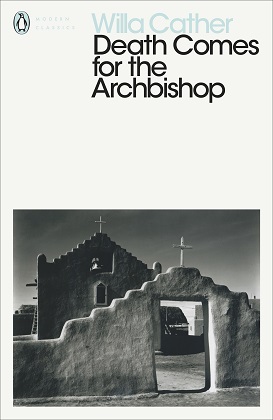A strong smell of campfire is permeating the traveler’s clothes and hair. After a long night, the desert air is cold enough to almost cut through skin. Fortunately, the hard sand underneath is not in the habit of releasing its precious treasure too quickly and is still radiating with the warmth of yesterday’s sun. A mouthful of strong coffee, drunk from a dented metal cup, steels you for the new day ahead. This is the dry, harsh, but never monotone landscape of New Mexico in the 18th century. This is where bishop Latour, our protagonist, travels – sometimes alone, more often with a companion. This is where they have their contemplative musings about human nature and about the way Man’s belief – in the holy trinity of the Catholic tradition or in superstitions that are born in these harsh landscapes – shape our prejudices and, as a result, our personal and national histories.

Bishop Latour is a white man, living and preaching in a land that has been in the clutches of quickly expanding occupation by other white men. It is a land sentenced to be torn apart and stitched back together again in their own, white image. The padre is a son of Europe and, as such, is molded by and a bearer of its history and tradition. As a priest, his calling is to save souls by shepherding them towards the church. However, he does not dismiss the natives of the Americas as mere savages to be stripped of their „improper“ ways and brought into the strictly confining bosom of the Old World’s Catholicism. The parishioners of his vast diocese are indeed the Lord’s flock but they are not sheep. Their native history and customs, carried from generation to generation through tales and songs, are as valid and worthy of preservation as are his own. In the end, it is the gradual disappearance of wild local landscapes, preserved until now by respectful and unobtrusive natives, that the padre mourns most.
Willa Cather’s (1873-1947) novel is to be savored slowly, like a large cup of Caffé Americano on a brisk, cold morning. Her sentences have the confidence of an experienced author – somebody with very little to prove and a wealth of knowledge to share. Her paragraphs are vivid and rich in flavor but never over salted or sickeningly sweet. Cather’s words transport you but do not smother you. There’s a masterful lightness and restraint to her work, even where serious, heavy subjects are touched upon. She wrenches your heart delicately, without trickery.
***
Penguin Books, 2018
Check from the e-catalogue ESTER
Kristel Palk
Head of the Department of Literature in Foreign Languages

